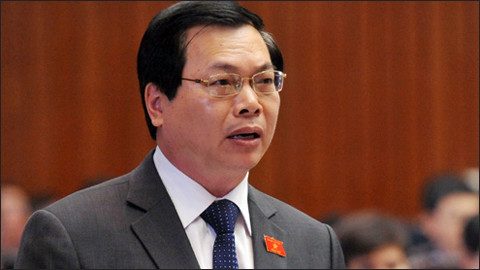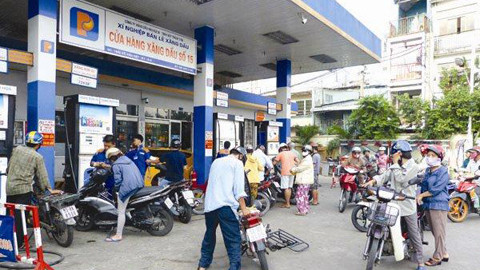Minister Vu Huy Hoang: No power shortage this year
The Minister of Industry and Trade said that the electricity industry is operating in the best condition with full backup plans.
Electricity, electricity prices and the ability to supply electricity are always a hot issue, especially when summer and dry season come. The representative of the Ministry of Industry and Trade in the most recent regular press conference also admitted that letting people still wonder about the transparency of electricity and gasoline prices is a shortcoming of the management agency.
In this week's "People ask - Minister answers" column, Minister of Industry and Trade Vu Huy Hoang explains issues regarding transparency in electricity prices as well as ensuring no power shortages during the dry season of 2014 and 2015.
| ||
| Minister of Industry and Trade Vu Huy Hoang (Photo: KT) |
Reporter: A citizen sent a letter to the program asking: "Previously, I heard a lot of talk in the press, but I really don't understand what the so-called "competitive electricity market", which means the market of several electricity companies competing with each other to sell to EVN, has to do with people like us? We are having to buy electricity at a fairly high regulated price, how can people know the price of electricity EVN buys to know whether the price they have to buy is reasonable or not?". Minister, please give me an answer.
Minister Vu Huy Hoang: The competitive electricity market is where power plants in a power system offer prices to buyers and based on that offer price, buyers can choose the plants that offer the lowest price, that is the principle of "competitive electricity market".
Second, in accordance with the Electricity Law and the 2012 decision of the Prime Minister, starting from July 1, 2012, we officially launched the competitive power generation market. Up to now, there are 49 power plants with a total capacity of about 12,300 MW, accounting for about 42% of the total designed capacity of the entire power system participating in the official competitive power generation market. These plants include: Plants of Vietnam Electricity Group, Vietnam National Coal and Mineral Industries Group, Vietnam National Oil and Gas Group and a number of independent power plants.
So operating on the principle of competition means that power plants must strive to reduce production costs and thereby be given priority to participate in the electricity supply. I think this is one of the conditions so that on the one hand, power producers can produce electricity at a cheap price, and on the other hand, beneficiaries, that is, people, can benefit from that low electricity price, because currently the price of electricity production accounts for about 70% of the total cost of electricity to consumers. If the electricity price sold to EVN is lower, consumers will benefit from that low electricity price, that is the purpose of introducing a competitive electricity generation market.
However, in the recent past, our public announcement of contents related to electricity prices as well as the production situation of the electricity industry in general still has some shortcomings and limitations. Therefore, consumers need to clearly understand the costs and factors related to electricity prices and thereby related to the electricity selling price to the people. And this is one of the reasons why the Ministry of Industry and Trade issued Directive No. 11 dated April 22, 2014 on public transparency of electricity prices.
Reporter: As the Minister just said, the Ministry of Industry and Trade has just issued a separate directive on transparency in the electricity and petroleum market business activities. Some listeners, when calling the column, expressed concern about what benefits people like them will have from this directive?
Minister Vu Huy Hoang: According to the general policy, I want to say that from the National Assembly to the Government, to the Prime Minister, essential goods serving production and people's lives need to be implemented according to a public and transparent mechanism because it is related to the rights of users.
Particularly for electricity and gasoline, these are two very important products for daily life and production. We have a policy that these two products, on the one hand, must follow the market mechanism but on the other hand, must be regulated by the state. Because it is related to the lives of each citizen, the state regulates the price of electricity and gasoline to avoid unreasonable price regulations and sales of electricity and gasoline products to consumers.
In Directive 11 of the Ministry of Industry and Trade, there are 3 main contents: First, it is necessary to publicize legal regulations on electricity prices, gasoline prices, mechanisms and measures to adjust electricity prices and gasoline prices if necessary. Second, publicize costs of the electricity industry as well as gasoline production and trading establishments, including the cost structure, market fluctuations for that type of goods, and information on the financial situation, production and business situation, including the income of employees in the electricity and gasoline industries. Third, regulate the agencies, institutions and means to carry out publicity and transparency so that information can reach the people in the widest, most popular and most frequent way.
I think that with the three contents of Directive 11 aimed at making electricity and petrol prices public and transparent, people will benefit from receiving such public information. And through such information, people will know the legal regulations on this issue, and thereby have the conditions to check and monitor whether the electricity and petrol industries are complying with the legal regulations or not. In addition, through the public announcement of the structure of electricity prices as well as petrol prices, people have the right to choose a reasonable price for themselves. Third, with this publicity, people have the ability to review and decide for themselves whether they use electricity and petrol economically and effectively. I think that these are the benefits that Directive 11 brings.
| ||
| Directive 11 aims to make electricity and gasoline prices transparent (Photo: KT) |
PV: Another question from the people: “Electricity is an essential commodity that has a great impact on production and people's lives. Up to now, people have found the calculation of electricity prices very complicated and difficult to understand. We would like to ask the Minister that after Directive 11 is issued by the Ministry of Industry and Trade, can people participate in monitoring EVN's electricity prices? And how?"
Minister Vu Huy Hoang: One of the objectives of the issuance of Directive 11 of the Ministry of Industry and Trade is to create conditions for consumers to monitor the activities of electricity and petroleum production units as well as to monitor the state management activities of state management agencies. This is also the implementation of the direction of the National Assembly, the Government, and the Prime Minister, all these products need to be publicly transparent in as much detail as possible, there is no reason not to be public and transparent.
Recently, we have done a number of things, state management agencies also regularly organize inspections and supervision of the activities of the electricity and petroleum industries, and also periodically and regularly publicly announce information on the production and business situation of these units. However, because our work is not systematic and continuous, many contents have not been fully publicly announced, so the issuance of Directive 11 aims to overcome the shortcomings and inadequacies in previous publicity and transparency, creating conditions for people to fully and objectively access the production and business situation of the electricity and petroleum industries and especially to know why they have to buy electricity and petroleum at that price?
I understand that our people always support the policies of the Party and the State, but when those policies are institutionalized, people really want the agencies to institutionalize them, that is a very reasonable right of the people, at the same time it is also the awareness of the people and the state management agencies, electricity and petroleum production units must clearly recognize that responsibility. Transparency is not only for the production and business activities themselves but also for the people to understand, support, share and agree with the policies and mechanisms issued by the Party and the State.
PV: Currently, the dry season is approaching its peak, so the demand for electricity will increase. Meanwhile, there is a lot of information that the ability to supply gas to the Ca Mau plant in the South is decreasing. Can the Minister tell us whether we will have a power shortage this year or not? And is there a risk of rotating power cuts in the upcoming summer?
Minister Vu Huy Hoang: There has never been a time when the electricity industry has been operating in such a good state, good means we have reserves. On average, the reserve factor is currently about 20% of the total electricity demand. This means that, in normal circumstances, when electricity demand increases by an average of 10-11%, the electricity industry is completely capable of meeting the demand, and this is also true for 2014 and even 2015.
However, there is a reserve and a reserve with such a rate, but if unfortunately a major incident occurs, there may be a time when the power supply is difficult. Recently, due to the incident of the gas field offshore in the sea between Vietnam and Malaysia, related to technical problems, the gas supply for power production was affected.
And faced with this situation, the electricity industry has also had plans to respond, in particular putting into operation the 500kV Pleiku - My Phuoc - Cau Bong line. This is the second 500kV power source to supply Ho Chi Minh City and the southern provinces. On May 5, it was put into operation and operated very well, ensuring the power supply for this dry season in the southern region.
In addition, the electricity industry also has a backup plan in case there is a higher demand for electricity, it will mobilize power plants running on other fuel sources such as diesel oil and fuel oil, then the electricity industry will meet enough electricity demand for the dry months of this year as well as in 2015./.
According to VOV








